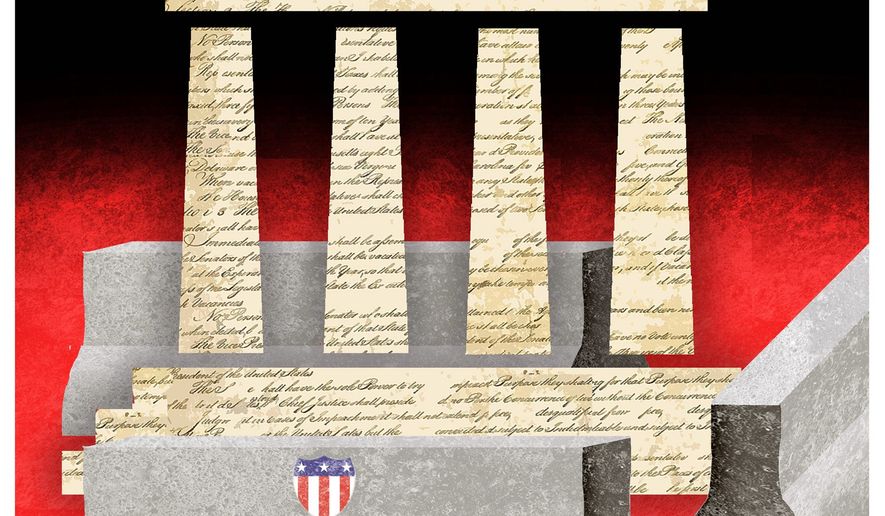OPINION:
Over the last several weeks, federal law enforcement officers have clashed with protesters in Portland, Oregon. The scenes are appalling and show what happens when unaccountable federal agents are unilaterally deployed to American streets as, essentially, an occupying force.
On Thursday, Oregon Gov. Kate Brown announced that she had reached an agreement with the White House to begin removing the federal agents from Portland. This is a good development, but it’s time to make reforms to prevent future clashes.
Six mayors, including Portland’s Ted Wheeler, recently wrote a letter to Congress, calling for legislation that would prevent the administration from sending in federal law enforcement without consulting local officials, would require the officers to be clearly identified at all times when they are deployed and would limit federal authorities to strictly protecting federal buildings.
While the reforms proposed by the mayors would be steps in the right direction, there’s plenty still left to do.
First, stricter standards are needed for when federal law enforcement agencies can be deployed — if ever they even need to be. Right now, there are 132,000 federal law enforcement officials, employed by 83 federal agencies, ranging from Customs and Border Patrol (CBP) to the National Park Service (NPS).
All of these agencies have their own missions, but nearly half of these agents work for the Department of Homeland Security (DHS) or one of its component agencies, such as CBP or Immigration and Customs Enforcement (ICE). DHS’s mission is to “prevent terrorist attacks in the United States, reduce America’s vulnerability to terrorism and minimize the damage and recover from acts that do occur.”
Deploying agents who are trained in counter-terrorism or immigration enforcement to protect a federal building from graffiti or damage, when there is a perfectly capable local department, is misguided and has led to much of the escalation we’ve seen in Portland.
Secondly, we need to demilitarize our police. Militarization naturally leads to escalation, sows distrust within communities and leads citizens to see officers as occupying forces. The distrust and fear of federal agents has been obvious in Portland as chants of “Whose streets? Our Streets” have rung out.
Researchers Eliav Lieblich and Adam Shinar find that “normalizing militarization assumes threat, implies a friend/enemy distinction, and therefore excludes the policed community.” This has clearly been the case in Portland. For example, there was the viral video of the Navy veteran who was beaten with a baton repeatedly and then pepper-sprayed and tear-gassed for absolutely no reason. There was also the incident where police shot a protester directly in the face with a rubber bullet, which fractured his skull.
Militarization is bad for the officers, as well. The R Street Institute’s Arthur Rizer has found that providing military equipment not only creates a division between the community and police, but also makes it harder for police to do their job. For example, when police are equipped with an M-4, which by its nature requires two hands, it limits their ability to use other more de-escalatory tools, which are the tools needed in most policing situations.
Last but not least, Congress should end the so-called “Constitution-Free Zone” — the area within 100 miles of a border or port of entry within which CBP has broad authority to conduct searches and seizures, allegedly for immigration enforcement purposes. Historically, this authority has led to abuse of power by CBP officers.
After all, approximately 200 million Americans, including the residents of Portland, live within the CFZ.
For too long, indiscriminately-conducted searches and seizures in this area have eroded Americans’ civil liberties and may have played a role in federal agents acting as recklessly as they have in Portland. For example, federal agents allegedly detained and searched 29-year-old Mark Pettibone, before driving him to the county courthouse and putting him in a holding cell. He was eventually read his Miranda rights and released without charges, but the act of detaining someone without probable cause is bad enough.
Earlier this month, Sen. Patrick Leahy, Vermont Democrat, and Rep. Peter Welch, Vermont Democrat, introduced a bill in both chambers of Congress to scale back the Constitution-Free Zone to 25 miles. While that would help to an extent, many of America’s largest cities still fall within that zone, leaving millions of people subject to unreasonable searches and seizures. Ultimately, the Constitution-Free Zone needs to be scrapped altogether. CBP can still be granted authority directly at points of entry, without expanding miles inland, trampling Americans’ civil liberties.
Yes, protesters who are resorting to violence should be held accountable, but that could well be achieved by local authorities, as Oregon’s Gov. Brown said. Federal officials have just escalated the situation, putting the mostly-peaceful protesters in a dangerous situation. It’s time to get the feds out of Portland, and make major reforms while we’re at it.
• Dan King is a senior contributor at Young Voices. He covers civil liberties and criminal justice reform.




Please read our comment policy before commenting.